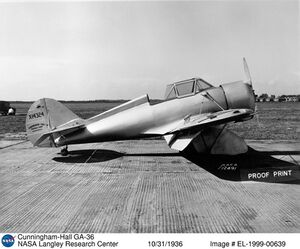Engineering:Cunningham-Hall GA-21M
| GA-21M | |
|---|---|
 Cunningham-Hall GA-36 tandem seat, military version of GA-21M. | |
| General information | |
| Type | Sports monoplane |
| National origin | United States |
| Manufacturer | Cunningham-Hall Aircraft Corporation |
| Designer | Randolph Hall |
| Number built | 1 |
| History | |
| First flight | 1934 |
The Cunningham-Hall GA-21 was an American two-seat monoplane design to compete for the Guggenheim Safe Aircraft Competition in 1934. Its distinguishing feature was full span flaps which could be manually or automatically adjusted. The GA-36 was a military version of it with tandem, rather than side-by-side seating.[1]
Design and development
The GA-21M was all metal aircraft apart from the fabric covering of parts of the wing, otherwise metal-covered, and the control surfaces. The low-set wings were rectangular in plan out to rounded tips and had a high lift section. Both flaps and ailerons filled the whole straight part of the trailing edge, so the latter only opened upwards.[2][3]
Apart from its unusual flaps and lateral control the GA-21M was conventional. Powered by a 145 hp (108 kW), seven cylinder Warner Super Scarab radial engine, it had a round-sectioned, metal-skinned, monocoque fuselage. An open cockpit over the forward wing seated two side-by-side. The tailplane was mounted just above the fuselage on the fin and could be trimmed; essentially triangular in plan, it carried rounded elevators. A rounded rudder reached down to the keel.[2]
The GA-21Ms had conventional, tailwheel landing gear with the landing wheels ahead of the leading edge within aircraft fairings that also enclosed the legs.[2]
The GA-36 was a 1936 military trainer rebuild of the Ga-21M. This included a revised, tandem cockpit and more trouser-like landing gear fairings, making it 15% heavier.[4][3]
The automated flaps worked well but were more complicated than, for example, Fowler flaps[3] and more expensive to construct. Simpler systems were preferred and the sole GA-21M/36 was sold in 1941, stripped of major components and dumped until the 1980s when it was recovered, fully restored and put on display at the Niagara Aerospace Museum.[5]
Specifications (GA-36)
Data from Aero Digest, March 1937[4]
General characteristics
- Crew: 2
- Length: 20 ft 0 in (6.10 m)
- Wingspan: 30 ft 0 in (9.14 m)
- Height: 6 ft 5 in (1.96 m)
- Wing area: 131 sq ft (12.2 m2)
- Empty weight: 1,490 lb (676 kg)
- Gross weight: 2,100 lb (953 kg)
- Fuel capacity: 29 US gal (24 imp gal; 110 l)
- Powerplant: 1 × Warner Super Scarab seven cylinder air-cooled radial piston engine, 145 hp (108 kW) at 2,050 rpm
- Propellers: 2-bladed Hamilton Standard, 8 ft (2.4 m) diameter
Performance
- Maximum speed: 158 mph (254 km/h, 137 kn)
- Cruise speed: 140 mph (230 km/h, 120 kn)
- Landing speed with-without flaps: 45–63 mph (72–101 km/h; 39–55 kn)
- Range: 450 mi (720 km, 390 nmi)
- Service ceiling: 14,000 ft (4,300 m)
- Rate of climb: 850 ft/min (4.3 m/s)
References
- ↑ https://airandspace.si.edu/collection-archive/cunningham-hall-collection/sova-nasm-xxxx-0447
- ↑ 2.0 2.1 2.2 "Cunningham-Hall Commercial Monoplane". Aero Digest (New York City: Aeronautical Digest Publishing Corp): 33. January 1935. https://archive.org/details/aerodigest2619unse/page/n40/mode/1up.
- ↑ 3.0 3.1 3.2 "American airplanes - Cu - Cy". www.aerofiles.com. 3 August 2008. http://aerofiles.com/_cu.html.
- ↑ 4.0 4.1 "Cunningham-Hall GA-36". Aero Digest (New York City: Aeronautical Digest Publishing Corp) 30 (3): 64. March 1937. https://archive.org/details/aerodigest3019unse/page/n277/mode/1up.
- ↑ Niagara Aircraft Museum - Collection
 |
